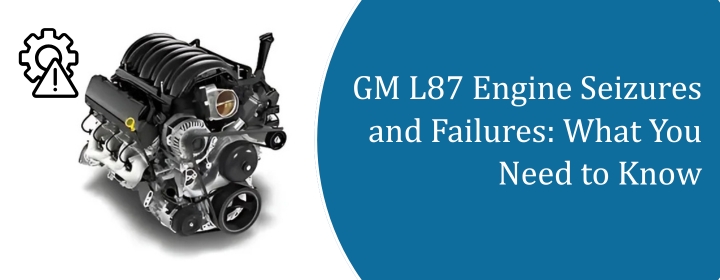
GM L87 Engine Seizures and Failures: What You Need to Know
The GM L87 engine is an engine with 6.2L V8. It was used in many of the late-models of General Motors trucks and cars and has been a subject for discussion in the automotive world. It was known for strong horse power and torque but many of the car owners reported issues like stalling, excess of oil consumption, and in many cases complete engine seizure. These failures lead to concern over long-term reliability, expensive repairing bill, and long disputes in the form of GM L87 engine lawsuit.
If you are a mechanic, car owner or someone who is thinking of used engine replacement, it is important to understand the problems related with this engine. Here in this blog, we will look at the most common GM L87 engine problems, the scope of recalls and lawsuit, and the available options for GM L87 engine replacement.
Understanding the GM L87 Engine
The GM L87 engine is part of EcoTec3 family. It features the advanced technologies like direct injection, cylinder deactivation, and VVT. These technologies were introduced to improve the efficiency and performance. But they also introduced complexity due to which there were frequent failures. GM L87 engine is found in many vehicles, including:
- Chevrolet Suburban
- GMC Sierra 1500
- Chevrolet Tahoe
- Cadillac Escalade
- GMC Yukon
Owners of these vehicles faced many issues which not only affect the driving experience but also raised questions about manufacturing defects.
Common GM L87 Engine Problems
While evaluating the GM L87 engine, there were complaints surfacing repeatedly across forums, repairing shops, and consumer reports. The most common issues include:
- Engine Seizures: Perhaps the most serious complaint is complete engine seizure. In many cases, this occurs suddenly and without warning, leaving drivers stranded. Seizures often result from internal oil starvation or failed lifters within the cylinder deactivation system. Once this occurs, the engine usually requires a full replacement.
- Excessive Oil Consumption: Another major concern is excessive oil consumption. Some owners report the need to add oil frequently between scheduled oil changes. It is because of piston rings or poor oil management in the combustion chamber.
- Lifter and Valve Train Failures: The lifter system in the GM L87 engine is related to the Dynamic Fuel Management feature. It has been identified as a weak point. Failed lifter causes misfiring, strange noises, and leads to complete engine failure if left unresolved.
- Electronic and Sensor Issues: Modern engines rely heavily on ECU and so does GM L87 engine. Owners have reported issues like delayed throttle response, faulty sensors, and stalling. These problems reduce reliability and confident driving.
- Unexpected Breakdowns: A recurring complaint is the unpredictability of failures. Some engines fail well before 60,000 miles, while others run longer but show signs of wear earlier than expected for a V8 of this size and cost.
GM L87 Engine Lawsuit and Recall Concerns
Because of so many complaints, the legal action has been surfaced for GM 6.2L L87 engine lawsuit. These lawsuits argue that GM sol vehicles with defective engines, and while failing it notifies the consumer of known risks. Owners taking legal action seek compensation for repairing, replacement, and diminished resale value.
There have also been discussions surrounding a GM L87 engine recall, though official large-scale recalls have been limited. Some technical service bulletins exist, but many owners feel the responses do not adequately cover the scope of failures. The lawsuits and recall consideration highlights the serious of the issue.
What to Do If You Own a GM L87 Engine Vehicle
If you own a vehicle with GM L87 engine, there are few practical steps for you to follow:
- Document Everything: First you need to keep a record everything from oil changing to repair invoices. Having proper document is important, if you want to claim a warranty coverage or legal compensation.
- Consult a Mechanic: If you notice any of the engine failing symptoms, you need to consult with a professional mechanic. Detecting the issue early can prevent you from complete engine failure.
- Check Warranty and Recall Status: You need to check if vehicle is eligible for coverage. Even limited service bulletins may reduce repair costs.
- Consider a Used Engine Replacement: If repairing cost is going beyond budget, it is better to replace the complete engine with used engine. It is the more practical option.
- Stay Informed on Lawsuits: If legal settlements move forward then you are eligible for compensation.
Used Engine Replacement as a Practical Solution
When the GM L87 engine fails completely, you have to replace an engine with reliable option. The price of brand-new engine is stressing and new crate motor is way out of league. In that case, you only left with one option which is used engine. It is a realistic and effective option for many car owners.
You have to source the used engine carefully which is inspected and tested before selling. The question is where you will find such engine; at careneginepart.com, we offer tested and inspected engine with warranty of up to 90 days.
Conclusion
In short, we can say that GM L87 engine is a powerful on paper but has too many real-word problems such as complete engine failure, excess of oil consumption, and lifter failure. These issues were spread widely and quickly which left the customer dissatisfaction. For many of the car owners, the best solution after a breakdown is considering a GM L87 engine replacement with reliable used engine. You can easily manage the risk linked with this engine by staying aware, noting down all the issues, and knowing where to find the dependable replacement engine.

